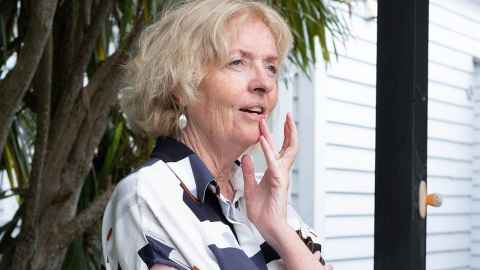Michele Leggott moving with these strange old times
25 June 2020
Professor Michele Leggott, who is blind, reflects on her new collection of poetry and new skills learned in lockdown.

After nine books of poetry, Professor Michele Leggott has selected moments in time for a new collection.
Mezzaluna, Selected Poems covers 30 years of poetry by Professor Michele Leggott, former New Zealand Poet Laureate.
“Each of my poetry books reflects a certain part of my life, not always autobiographical, but it does reflect what I was doing and what I was interested in,” says Michele.
Her style of writing, and subject matter, has changed over the years, in part necessitated by losing her sight, and the collection reflects this.
In 1985, she was diagnosed with a mild form of retinitis pigmentosa (RP) or night blindness. But in 1994, she was diagnosed with a more severe form of RP. It gradually destroys cells in the retina that are responsible for colour vision and fine focus.
“It’s best to deal with each stage of the decline as it happens and to figure out ways around it. That’s why I’m happy to talk about it, but I’ve never wanted to be pigeonholed as a ‘blind writer’ or a ‘blind lecturer’. It’s part of who I am. It’s part of what I do.”
Michele has earned many accolades over the years, including the Prime Minister’s Award for Literary Achievement in Poetry, the New Zealand Order of Merit and the inaugural New Zealand Poet Laureateship in 2007.
Her earlier books reflect the modernist tradition – poems with long lines, long gaps and no punctuation. “When I was starting out, I liked to create really complex poems, because that’s what modernist poets do,” she says.
“I made the decision to have less punctuation and more spacing. What it gives me is uncertainty … the ability to stretch the language. I’m not bound by convention.”
But the loss of her eyesight meant she had to change the ‘shape’ in which she wrote.
“From 2012, I learned how to work with audio software. But because screen readers are set up for normative punctuation, I couldn’t make it read the lines that didn’t have punctuation.
“It was driving me mad because I could write the poems, leaving the gaps in my mind’s eye. But when I came to read them, the screen reader wouldn’t give me the pauses that were the white spaces. I was appalled that I couldn’t find a way out of that corner the screen reader had put me into. But in the end, it gave me a new way of writing … prose poetry.”
I’m happy to talk about it, but I’ve never wanted to be pigeonholed as a ‘blind
writer’ or a ‘blind lecturer’. It’s part of who I am. It’s part of what I do.
While the University has been closed, Michele has embraced the opportunity for a new way of teaching, too.
“Zoom classroom is amazing and the best tool we could have been given. It took a while to get used to the format, but our poetry students are with us in real time, they can see and talk to each other and that is a huge benefit.
“But I’m glad we got three weeks in the physical classroom before having to take everything online. It means students have had time to work with each other’s poems and develop trust that is needed for creative-writing peer review.”
– Denise Montgomery
This article first appeared in the Winter 2020 edition of Ingenio magazine.
Email: ingenio@auckland.ac.nz